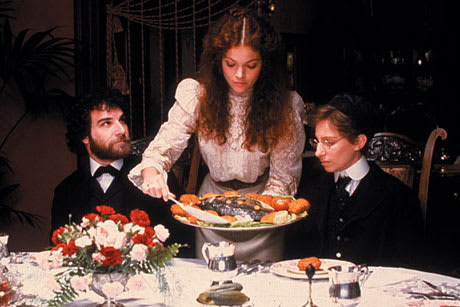If you've ever wondered why Barbra Streisand is a gay icon, look no further than her directorial debut. If it's not the gayest movie ever, it must have been at least the gayest movie of 1983. Here, Babs tries to butch it up as an aspiring Talmud scholar, because in her small Eastern Europe town in 1904, women aren't allowed anywhere near sacred texts. So, after the death of her father, young Yentl leaves town, changes her name to Anshel and winds up in a yeshiva where she shares a platonic bed with the dashing Mandy Patinkin on her first night. An uber-geek, she loves the intellectual stimulation she finds in this male world but starts casting increasingly longing looks at Patinkin, who finds himself making awkwardly homoerotic gestures toward this girlish man. As the plot develops, Yentl/Anshel is married off to a woman (Amy Irving) who finds Streisand's charms much more interesting than the dominant machismo she grew up with. All three of the major characters are closeted in some way or another, suppressing secret longings. That's well and good, except that this is still a Barbra Streisand musical and Alan and Marilyn Bergman's expository lyrics are unintentionally hilarious, while Michel Legrand's music is no better. Despite the pleasure of watching a dyke-y Streisand cross-dressing and Twelfth Night plot twists, the drama drags to a tedious crawl. The weakest link is the monotonous Amy Irving (best known as the best friend in Carrie), who doesn't help matters in her role as the creepy corner of the love triangle — one half expects her to will a bucket of pig blood to rain all over these crazy Talmud-thumpers. (Reaction to Irving at the time was polarized, with nominations for both Best and Worst Supporting Actress at the Oscars and Golden Raspberries, respectively.) At a time when female directors in Hollywood were non-existent, first-time director (and co-producer, and co-writer) Streisand does handle the epic scope and visual splendour of the film remarkably well; it's a shame she only helmed two other films in her career. Yet Yentl is neither a great musical nor good campy fun, even though the idea of a woman not being allowed to go to school or read sacred texts isn't as medieval as you might think in many parts of the world. Instead, Yentl looks and sounds like a dusty, dry artefact that's best left on the shelf. If this film does mean anything to you, however, it will have been worth the wait for it to make its debut on DVD, with a two-disc set featuring a director's cut, feature-length commentary from Streisand, rehearsal reels, deleted songs set to storyboards and an illuminating 8mm film she shot in Prague while conceptualizing the film.
(MGM)Yentl
Barbra Streisand

BY Michael BarclayPublished Mar 3, 2009



